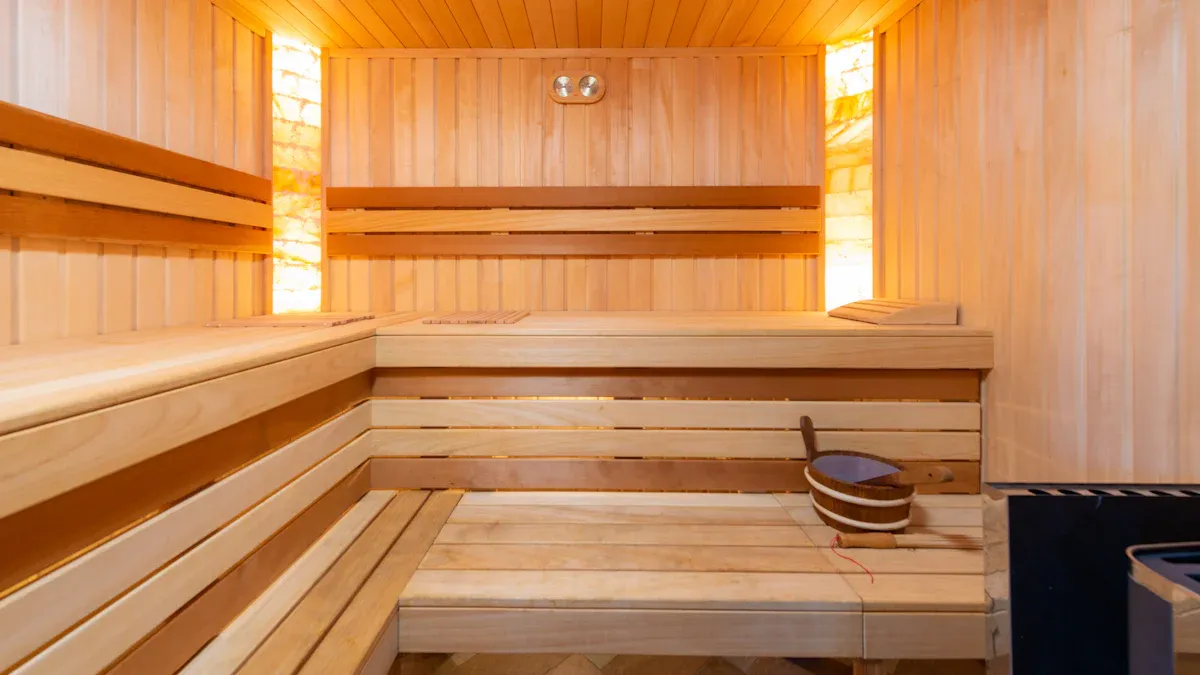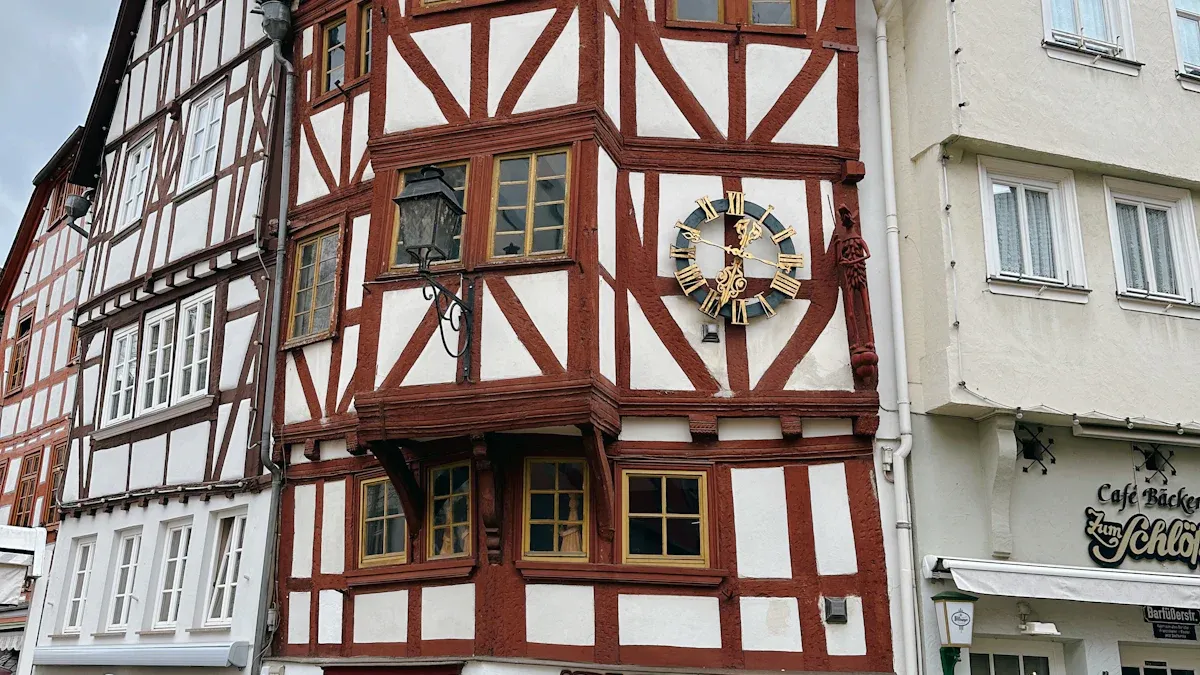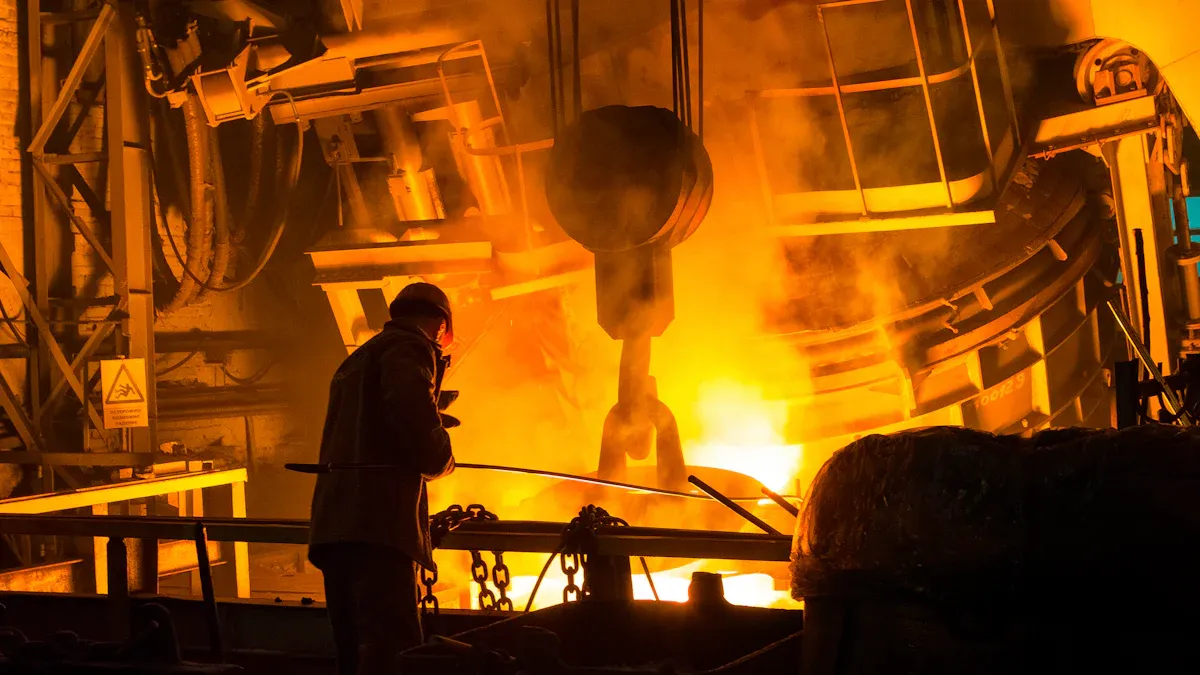
A prominent German hotel chain encountered significant challenges in maintaining energy efficiency while ensuring guest comfort. Rising operational costs and outdated heating systems placed a strain on their resources. Research indicates that 76% of travelers prefer hotels with green certifications, and 43% are willing to pay more for sustainable accommodations. By implementing advanced furnaces from Ningbo Xiunan International Trading Co., Ltd., the hotel achieved outstanding results. This case study emphasizes a European client success, demonstrating how customized solutions effectively reduced energy consumption and enhanced guest satisfaction.
Key Takeaways
- Modern furnaces use less energy, cutting costs and helping the environment.
- Custom heating systems keep guests comfortable with steady temperatures and cleaner air.
- Using energy-saving systems supports global eco-goals, drawing green travelers and staying competitive.
Case Study Background
Overview of the Hotel Chain
The German hotel chain featured in this case study operates a diverse portfolio of properties across urban and resort destinations. Its market presence is defined by a strong focus on guest satisfaction and operational excellence. The chain manages a significant number of rooms, offering premium services to travelers seeking comfort and convenience.
| Metric | Description |
|---|---|
| Number of Hotel Properties | Operates multiple properties across Germany and neighboring countries. |
| Number of Hotel Rooms | Thousands of rooms catering to business and leisure travelers. |
| Average Daily Room Rate (ADR) | Competitive pricing ensures accessibility while maintaining profitability. |
| Occupancy Rate | High utilization rates reflect the chain’s popularity among guests. |
| Revenue Per Available Room (RevPAR) | Demonstrates strong financial performance and market competitiveness. |
Sustainability and Market Position
The hotel chain has embraced sustainability as a core element of its business strategy. Many large hotel companies, including this one, align their goals with the Paris Climate Agreement to reduce greenhouse gas emissions. The chain has implemented green building practices and energy-efficient technologies to meet these objectives.
- Radisson Hotel Group, a key competitor, aims for Net Zero by 2050, highlighting the industry’s shift toward sustainability.
- Guests, investors, and employees increasingly value responsible environmental practices, driving demand for eco-friendly accommodations.
- The hotel industry contributes approximately 1% of global carbon dioxide emissions, emphasizing the need for decarbonization.
This commitment to sustainability strengthens the chain’s market position, attracting environmentally conscious travelers and investors.
Heating and Energy Efficiency Needs
Heating and energy efficiency represent critical operational priorities for the hotel chain. HVAC systems account for nearly half of a hotel’s total energy consumption, making them a significant area for improvement. By optimizing these systems with advanced technology, hotels can achieve substantial energy savings while maintaining guest comfort.
The hospitality sector has the potential to save 4,300 GWh annually through improved energy efficiency measures. For this hotel chain, adopting innovative heating solutions was essential to reduce costs, enhance sustainability, and meet growing environmental compliance requirements.
Challenges Before the Furnaces
Rising Operational Costs
The German hotel chain faced escalating operational costs, which significantly impacted its profitability. Routine maintenance and emergency repairs for outdated heating systems consumed a substantial portion of the budget.
| Cost Category | Estimated Annual Cost ($) | Percentage of Total Operating Costs (%) |
|---|---|---|
| Routine Maintenance | 15,000 | 20% |
| Emergency Repairs | 10,000 | 13% |
| Renovations and Upgrades | 25,000 | 34% |
| Miscellaneous Repairs | 5,000 | 7% |
Utility expenses further compounded the issue. Electricity alone accounted for 30% of total operating expenses, with an average monthly cost of $5,000. Gas and water costs added to the financial strain, making energy efficiency a critical priority.

Heating System Inefficiencies
The hotel’s previous heating systems were outdated and inefficient, leading to excessive energy consumption. HVAC systems, which typically account for 50% of a hotel’s energy use, were a major contributor to these inefficiencies.
- Inefficient systems resulted in higher energy bills and inconsistent heating performance.
- Studies show that optimizing HVAC systems with intelligent automation can reduce energy consumption by up to 30%.
- New buildings with advanced heating solutions achieve energy savings of 20% to 50%, highlighting the potential for improvement.
The lack of smart technology in the existing systems hindered the hotel’s ability to manage energy effectively, impacting both operational costs and guest satisfaction.
Environmental and Compliance Pressures
The hospitality industry faces increasing pressure to comply with environmental regulations aimed at reducing carbon emissions. Stricter standards for energy efficiency and refrigerant usage have reshaped the HVAC market.
- Hotels must adopt eco-friendly practices to meet regulatory requirements and avoid penalties.
- Non-compliance risks include financial penalties and higher capital investments in the future.
- Mandatory disclosure requirements and rising energy prices further emphasize the need for sustainable solutions.
By addressing these challenges, the hotel chain aimed to align with global sustainability goals and enhance its market position. This case study demonstrates how overcoming these obstacles was essential for long-term success.
The Furnace Solution

Features and Benefits of the Furnaces
The furnaces provided by Ningbo Xiunan International Trading Co., Ltd. offered advanced features that directly addressed the hotel chain’s energy efficiency goals. These energy-efficient models significantly reduced utility bills during peak heating months. Their high-efficiency design minimized wasted energy by utilizing higher Annual Fuel Utilization Efficiency (AFUE) ratings. This not only lowered operational costs but also reduced emissions, improving both indoor and outdoor air quality.
The furnaces also incorporated advanced technology to enhance reliability and longevity. This ensured consistent performance, reducing the need for frequent maintenance. Additionally, the investment in these energy-efficient options aligned with the hotel chain’s sustainability goals, further strengthening its market position.
Installation and Customization Process
The installation process was seamless and tailored to the hotel chain’s specific requirements. A dedicated team conducted a thorough assessment of each property to identify unique heating needs. This allowed for the customization of furnace systems to optimize performance across diverse locations.
The project team ensured minimal disruption to hotel operations during installation. By employing a phased approach, they completed the upgrades efficiently without affecting guest experiences. The use of quality management system (QMS) planning at the process level ensured that all installations conformed to internal specifications and customer requirements.
Addressing the Hotel’s Specific Challenges
The furnaces effectively addressed the hotel chain’s challenges by improving energy efficiency and reducing operational costs. The advanced heating systems replaced outdated equipment, eliminating inefficiencies that previously led to excessive energy consumption. This upgrade resulted in significant cost savings and enhanced guest comfort.
The furnaces also helped the hotel chain meet environmental compliance standards. By producing fewer emissions, the systems supported the chain’s commitment to sustainability. The integration of smart technology allowed for better energy management, further aligning with the chain’s long-term goals. This case study highlights how tailored solutions can drive measurable success in the hospitality industry.
Results of the Case Study

Enhanced Energy Efficiency
The implementation of advanced furnaces significantly improved the hotel chain’s energy efficiency. By replacing outdated systems, the chain reduced energy consumption across its properties. The furnaces’ high Annual Fuel Utilization Efficiency (AFUE) ratings ensured optimal performance, minimizing energy waste.
A comparison with other projects highlights the impact of these upgrades. For instance:
| Case Study | Energy Reduction | Cost Savings | Certifications |
|---|---|---|---|
| Johnson Braund Design Group | 69% | Not specified | Not specified |
| Aventine | 75% | Not specified | LEED Platinum, Energy Star 100 |
| 1525 Wilson Boulevard | 35% | Over $250,000 | Not specified |
This case study demonstrates how tailored heating solutions can achieve similar results, aligning with the hotel chain’s sustainability goals.
Cost Savings Achieved
The furnaces delivered measurable cost savings by reducing utility expenses and maintenance costs. The hotel chain reported a significant decrease in monthly energy bills, particularly during peak heating seasons. The advanced technology also minimized the need for frequent repairs, further lowering operational expenses. These savings allowed the chain to allocate resources toward other strategic initiatives, enhancing overall profitability.
Improved Guest Experience
The upgraded heating systems enhanced guest comfort by providing consistent indoor temperatures. Guests experienced fewer disruptions caused by heating malfunctions, leading to higher satisfaction rates. The improved air quality, resulting from reduced emissions, also contributed to a healthier and more pleasant environment. These factors strengthened the chain’s reputation for delivering exceptional hospitality.
Positive Environmental Outcomes
The furnaces supported the hotel chain’s commitment to sustainability by reducing carbon emissions. The energy-efficient systems aligned with global environmental standards, helping the chain meet regulatory requirements. By adopting these eco-friendly solutions, the chain positioned itself as a leader in sustainable hospitality, attracting environmentally conscious travelers and investors.
Key Success Factors in the Case Study
Product Quality and Innovation
The furnaces used in this case study exemplify exceptional product quality and cutting-edge innovation. Customers frequently commend their durability and efficient performance, which ensures long-term reliability. For instance, Ruud furnaces are widely recognized for their longevity and high standards, supported by numerous positive reviews. Similarly, Deltech’s electric resistance furnaces maintain a reputation for handling unique projects with precision, reflecting rigorous quality standards.
Technological advancements also played a pivotal role in the success of these furnaces. The global shift toward energy-efficient systems, driven by environmental regulations, has spurred innovations that enhance both performance and sustainability. Carrier’s NFC technology, for example, simplifies installation and servicing, showcasing how innovation can improve operational efficiency. These features collectively highlight the furnaces’ ability to meet the hotel chain’s energy efficiency goals while maintaining superior quality.
Collaboration and Teamwork
The success of this case study relied heavily on seamless collaboration between the hotel chain and the furnace supplier. A dedicated project team worked closely with the hotel’s management to understand their specific needs. This partnership ensured that every aspect of the installation process aligned with the chain’s operational requirements.
Effective teamwork extended to the customization phase, where engineers and technicians collaborated to design tailored solutions. Regular communication and a shared commitment to excellence enabled the project to progress smoothly, minimizing disruptions to hotel operations. This collaborative approach not only ensured the project’s success but also strengthened the relationship between the two organizations.
Tailored Solutions for the Hotel Chain
Customizing the furnaces to address the hotel chain’s unique challenges was a key factor in achieving success. The project team conducted detailed assessments of each property to identify specific heating requirements. This allowed them to design and implement systems that optimized energy efficiency across diverse locations.
The tailored solutions also aligned with the chain’s sustainability objectives. By integrating advanced technology, the furnaces reduced energy consumption and emissions, helping the chain meet environmental compliance standards. This personalized approach demonstrated how understanding a client’s needs can lead to impactful results, as evidenced by the outcomes of this case study.
Future Opportunities
Long-Term Benefits of the Furnaces
The furnaces installed by the German hotel chain offer enduring advantages that extend beyond immediate energy savings. Their high Annual Fuel Utilization Efficiency (AFUE) ratings ensure consistent reductions in energy consumption, leading to substantial cost savings over time. For example:
| Benefit | Description |
|---|---|
| Energy Savings | Significant reductions in energy bills, particularly during peak heating months. |
| Environmental Sustainability | Lower fuel usage decreases reliance on fossil fuels, promoting renewable energy adoption. |
| Long-term Financial Benefits | Higher efficiency ratings save hundreds annually on heating costs over the furnace’s lifespan. |
These benefits not only enhance operational efficiency but also contribute to the hotel’s financial stability. By investing in advanced heating systems, the chain has positioned itself for sustained success in a competitive market.
Alignment with Sustainability Goals
The furnaces align seamlessly with the hotel chain’s commitment to sustainability. Their energy-efficient design minimizes emissions, improving air quality and reducing the carbon footprint. Key environmental advantages include:
- Conservation of natural resources through reduced fuel consumption.
- Higher AFUE ratings that lower energy waste and greenhouse gas emissions.
- Support for global sustainability initiatives by meeting stringent environmental benchmarks.
This alignment strengthens the chain’s reputation as a leader in eco-friendly hospitality, attracting environmentally conscious guests and investors.
Potential for Growth and Innovation
The adoption of advanced furnace systems opens doors to future growth and innovation. Industry forecasts highlight several opportunities:
| Growth Factor | Description |
|---|---|
| Energy Efficiency | Rising demand for eco-friendly solutions driven by environmental regulations. |
| Automotive Sector Growth | Expansion of electric vehicle production fueling demand for industrial furnaces. |
| Customized Technologies | Increasing need for tailored furnace solutions in specialized industries. |
The global gas furnace market, for instance, is projected to grow over 5.2% annually through 2032, driven by the replacement of aging systems and the push for energy efficiency. By staying ahead of these trends, the hotel chain can continue to innovate and maintain its competitive edge in the hospitality industry.
The German hotel chain overcame rising costs, inefficient heating systems, and environmental pressures by adopting advanced furnaces. These solutions delivered measurable results, including reduced energy consumption, cost savings, and enhanced guest comfort.
| Case Study | Challenges | Solutions | Measurable Results |
|---|---|---|---|
| Holt Public Schools | Energy costs | ESPC | $3M savings in 12 years |
| Knox County Schools | Energy inefficiency | Collaboration with Trane | $74M savings |
| Hillsborough Community College | High energy costs | Five-year plan with Trane | $1.8M savings, 23M kWh reduced |
Businesses seeking energy-efficient solutions can achieve similar success by exploring tailored heating systems.
FAQ
What makes this case study unique?
This case study highlights a tailored approach to energy efficiency, showcasing how customized furnace solutions addressed specific challenges in the hospitality industry.
How did the furnaces improve guest satisfaction?
The furnaces provided consistent indoor temperatures and improved air quality, creating a comfortable and healthy environment that enhanced the overall guest experience.
Can other industries benefit from similar solutions?
Yes, industries requiring energy-efficient heating systems can adopt these advanced furnaces to reduce costs, improve sustainability, and meet regulatory standards.
Post time: Mar-28-2025
